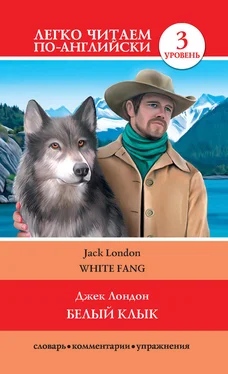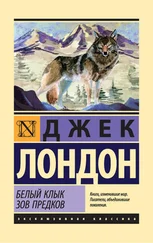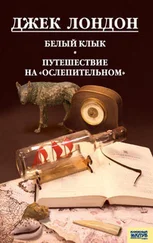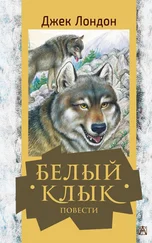The horse ran across the pasture. Suddenly a jackrabbit leaped under its feet. The horse stumbled, the master fell and apparently broke his leg. White Fang sprang in a rage at the throat of the offending horse, but was stopped by the master’s voice.
“Home! Go home!” the master commanded.
White Fang did not want to leave. The master thought of writing a note, but had no pencil and paper in his pockets. Again he commanded White Fang to go home.
The latter regarded him wistfully, started going, then returned and whined softly. The master talked to him gently but seriously, and he listened with painful attention.
“That’s all right, old fellow, you just run home. Go home and tell them what’s happened to me. Home with you, you wolf. Go home!”
White Fang knew the meaning of “home” and he knew it was the master’s will that he should go home. He turned and trotted reluctantly away. Then he stopped and looked back over his shoulder.
“Go home!” came the sharp command, and this time he obeyed.
The family was on the porch, when White Fang arrived. He came to them, panting, covered with dust.
“Weedon’s back,” Weedon’s mother announced.
The children welcomed White Fang with glad cries and ran to meet him. He avoided them and passed down the porch, but they blocked his way. He growled and tried to push by them.
“I confess, he makes me nervous around the children,” their mother said. “I fear that he will hurt them unexpectedly someday.”
Growling savagely, White Fang sprang, overturning the boy and the girl. The mother called them and comforted them, telling them not to bother White Fang.
“A wolf is a wolf!” commented Judge Scott.
“But he is not all wolf,” objected Beth, standing for her brother [54]in his absence.
“He just supposes that there is some part of dog in White Fang; but he knows nothing about it,” said the judge. “As for his appearance – ”
He did not finish his sentence. White Fang stood before him, growling fiercely.
“Go away! Lie down, sir!” Judge Scott commanded.
White Fang turned to the love-master’s wife. She screamed with fright as he seized her dress in his teeth and dragged on it till the fabric tore away. By this time he had become the centre of interest.
He had ceased growling and stood, head up, looking into their faces. His throat worked spasmodically, but made no sound, while he tried to verbalize something.
“I hope he is not going mad,” said Weedon’s mother. “I told Weedon that I was afraid the warm climate would be bad for an Arctic animal.”
“He’s trying to speak, I believe,” Beth announced.
At this moment speech came to White Fang, and he barked.
“Something has happened to Weedon,” his wife said decisively.
They were all on their feet now, and White Fang ran down the steps, looking back for them to follow. For the second and last time in his life he had barked and made himself understood.
After this event he found a warmer place in the hearts of the Sierra Vista people, and even the groom whose arm he had slashed admitted that he was a wise dog even if he was a wolf.
As White Fang’s second winter in the Southland came on, he made a strange discovery. Collie’s teeth were no longer sharp. There was a playfulness about her, and she did not hurt him anymore. He forgot that she had been his biggest problem, and when she ran and played around him he tried to be playful and becoming no more than ridiculous.
One day she led him off on a long chase into the woods. It was the afternoon that the master was to ride, and White Fang knew it. The horse stood saddled and waiting at the door. White Fang hesitated. But there was a thing deeper than all the laws he had learned, than his love for the master, than the very will to live. When, in the moment of his hesitation, Collie called him, he turned and followed after. The master rode alone that day; and in the woods, side by side, White Fang ran with Collie, as his mother, Kiche, and old One Eye had run long years before in the silent Northland forest.
Chapter V. The Sleeping Wolf
It was about this time that the newspapers wrote of the escape of a convict from San Quentin prison. He was a ferocious man. He was born mad, and his life made him even madder. In short, he was a beast.
Punishment failed to break his spirit. Its only effect was to make him fiercer. Strait-jackets, starvation, and beatings were the wrong treatment for Jim Hall; but it was the treatment he received. It was the treatment he had received from the time he was a little boy in San Francisco – soft clay in the hands of society.
In prison Jim Hall killed a guard who had treated him cruelly. After this, he lived in the separate cell for three years. He never left this cell. He never saw the sky or the sunshine. He was buried alive. [55]He saw no human face, spoke to no one. He hated all things. For weeks and months he never made a sound, in the black silence eating his very soul.
And then he escaped. He killed more guards to do so, and he took their weapons. A price of gold was upon his head. Farmers, bloodhounds, detectives – all tried to find him. His blood might pay off a mortgage [56]or send a son to college. Sometimes people saw him, and tried to catch, but in vain.
And then Jim Hall disappeared. In the meantime the newspapers at Sierra Vista were read not so much with interest as with anxiety. The women were afraid. And Judge Scott knew that in his last days of his work as judge Jim Hall had stood before him and received sentence. And in open court-room, before all men, Jim Hall had promised that the day would come when he would revenge the Judge that sentenced him.
For once, Jim Hall was right. He was innocent of the crime for which he was sentenced. It was “rail-roading.” [57]Jim Hall was being “rail-roaded” to prison for a crime he had not committed. Because of the two prior convictions [58]against him, Judge Scott imposed upon him a sentence of fifty years.
Judge Scott did not know all things, and he did not know that the evidence was faked, that Jim Hall was guiltless of the crime charged. And Jim Hall, on the other hand, did not know that Judge Scott was ignorant. To him, Judge Scott was the main figure there.

Of all this White Fang knew nothing. But between him and Alice, the master’s wife, there existed a secret. Each night, after Sierra Vista had gone to bed, she rose and let in White Fang to sleep in the big hall. White Fang was not a house-dog, nor was he permitted to sleep in the house; so each morning, early, she came down and let him out before the family was awake.
On one such night, while all the house slept, White Fang awoke and lay very quietly. And very quietly he smelled a strange god’s presence. And to his ears came sounds of the strange god’s movements. White Fang did not make a sound, it wasn’t his style. The strange god walked softly, but more softly walked White Fang. He followed silently. He knew the advantage of surprise.
The strange god paused at the foot of the great staircase and listened. Up that staircase the way led to the love-master and to the love-master’s dearest possessions. White Fang bristled, but waited. The strange god’s foot lifted. He was beginning the go upstairs.
Then White Fang struck. He gave no warning, no snarl. He leaped and landed on the strange god’s back. White Fang clung with his fore-paws to the man’s shoulders, at the same time burying his fangs into the back of the man’s neck. He clung on for a moment, long enough to drag the god over backward. Together they fell on the floor. White Fang leaped aside, and, as the man struggled to rise, leaped again with the slashing fangs.
Читать дальше
Конец ознакомительного отрывка
Купить книгу


![Джек Лондон - Белый Клык [сборник]](/books/30184/dzhek-london-belyj-klyk-sbornik-thumb.webp)









